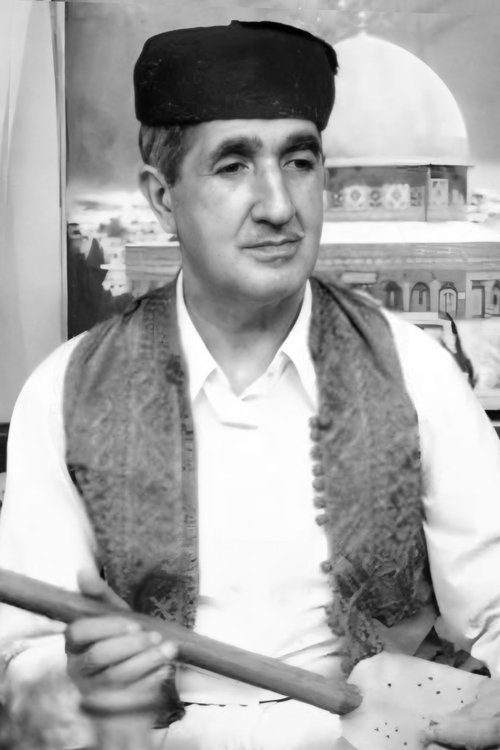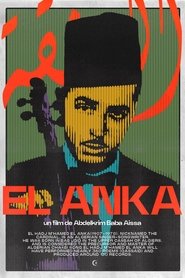detail profile cheikh namous

Cheikh Namous
Mohamed Rachidi
atau dikenal sebagai
Riwayat Hidup
Cheikh Namous, also known by his birth name Mohamed Rechidi, is an Algerian musician, born in May 1920 in the Casbah of Algiers and died in January 2021.
He is considered one of the first banjo performers in Algeria and has collaborated with figures of chaâbi music, such as Hadj El Anka, Dahmane El Harrachi.
Cheikh Namous, born Mohamed Rechidi, was born in May 1920 in the Casbah of Algiers, into a family from Afir, Talarous village (near Dellys in the wilaya of Boumerdès).
At the age of 12, he purchased his first guembri and demonstrated an early interest in music.
After receiving his school certificate in 1933, he worked in various jobs, but his passion for music was always present.
He began playing the mandola before becoming a virtuoso on the banjo, his instrument of choice.
In the 1930s, he joined the orchestra led by Abderrahmane Sridek, then the orchestra of Hadj El Anka, where he was one of the first to introduce the banjo into the orchestra in 1941.
He is known for being one of the first banjo musicians in Algerian orchestras.
During the 1950s, he worked with the Kabyle radio orchestra under the direction of Nourdine Meziane.
He works in particular Chérifa, Djida, Djamila, Rabah Taleb, Abdiche Belaïd, Akli Yahyaten, Arab Ouzelague.
Cheikh Namous is considered a pioneer of chaâbi music, thanks to his mastery of the banjo and his impact on this musical genre.
After Algeria's independence, he continued to work with performers of the genre, such as El Hachemi Guerouabi, Boudjemaâ El Ankis, Amar Ezzahi and Dahmane El Harrachi.
He also founded a music school where he trained several generations of musicians and was considered the dean of Algerian musicians.
His nickname Namous (“mosquito”) was given to him because of his boundless activity and his speed in his musical playing.
Namous is the father of 14 children.
He died at the age of 101, at his home in the popular district of Diar Djemaâ, in El Harrach (Algiers), on the night of Monday to Tuesday of January 19, 2021.
Info Pribadi
Peran Yang Di Mainkan Cheikh Namous
 The artistic journey of Dahmane El...
The artistic journey of Dahmane El...The Revolution Of El Harrachi 2014
The artistic journey of Dahmane El Harrachi, born in 1925 in Algiers, bears the mark of his experience. An attentive and vigilant observer of the environment of immigrant workers, Dahmane has always avoided falling into the ambient miserabilism. From the Algerian Chaâbi, he has kept certain melodic lines and a clear propensity for sayings drawn from the oral poetic tradition. El Harrachi uses simple language, understandable by all popular sectors of the Maghreb, which partly explains its wide success. In 1949, he went to France and it was in cafes, springboard places where people come to breathe the air of the country, that he performed regularly. Elegant, with his beautiful atmosphere, the “bluesman” of the suburbs seduces, upsets and stirs consciences. Discovered late by the new generation, the creator of Ya Rayah met a tragic end, on August 31, 1980, in a car accident, on the Algiers coast which he sublimated above all else.
 14 In 1925 the young Mhamed El Anka...
14 In 1925 the young Mhamed El Anka...العنقة (El Anka) 1981
1/4 - In 1925, the young M’hamed El Anka replaced his master Nador at short notice. He realizes that he is far from mastering all the instruments of his art and begins a self-taught training program in Oud, the Arabic language, and religious singing in the hadra of Sidi Abderrahmane. 2/4 - In 1932, the young El Anka released 10 45 rpm records in Paris, including the first song from his composition "L'Exil". He is gradually “lightening” the Andalusian heritage. He made the pilgrimage to Mecca and wrote the famous song "El Mendouza". 3/4 - The 40s and 50s will confirm the maturity of the master, who consolidates the constituent elements of what is today called Chaâbi music. In the midst of the national liberation struggle, El Hadj M'hamed El Anka triumphs with the song "Youm El Djemâa". 4/4 - In 1962, El Anka sang of independence: "El hamdou lilah, mabqach listaâmar fi bledna". Activist, poet and musicologist Bachir Hadj Ali explains the artist’s exceptional style.
